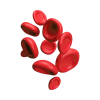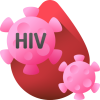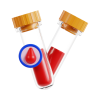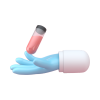


The early 1980s marked the emergence of a mysterious disease that would later become a global health crisis. In December 1982, Françoise Barré-Sinoussi, a young researcher, was working in the laboratory of Jean-Claude Chermann, part of Luc Montagnier’s Viral Oncology Unit. They received a request from clinicians and virologists at Bichat Hospital in Paris to isolate an unknown retrovirus, suspected to be related to the Human T-Lymphotropic Virus (HTLV). In January 1983, the laboratory received its first lymph node sample from a patient in the pre-AIDS phase. Within just two weeks, they identified a new human retrovirus, initially named Lymphadenopathy-Associated Virus (LAV). On May 20, 1983, their groundbreaking work on this retrovirus was published in the journal Science, eventually being renamed Human Immunodeficiency Virus (HIV) in 1986.

HIV infection in humans has its roots in a type of chimpanzee found in Central Africa. Research suggests that HIV may have crossed over from chimpanzees to humans as far back as the late 1800s. This transmission likely occurred when humans hunted chimpanzees for meat and came into contact with their infected blood.

HIV, or Human Immunodeficiency Virus, is a formidable infection that specifically targets the body’s immune system. It primarily attacks white blood cells, particularly CD4 cells, a type of T-cell, leading to the weakening of the immune system. This weakened immunity makes the body more susceptible to various diseases, such as tuberculosis, fungal infections, viral infections, and certain types of cancer.
AIDS, which stands for Acquired Immunodeficiency Syndrome, is the most advanced stage of HIV infection, reached when the immune system has been significantly compromised. HIV infection progresses to AIDS when the CD4 cell count drops below a certain level, and the person begins to experience severe health problems.

HIV is primarily transmitted through various bodily fluids, including blood, breast milk, semen, and vaginal fluids. It is important to note that HIV is not spread through casual contact, such as kisses, hugs, or sharing food. It can, however, be transmitted from an infected mother to her baby during pregnancy, childbirth, or breastfeeding.

Most individuals infected with HIV experience a short, flu-like illness within 2 to 6 weeks after infection. After this initial phase, HIV may remain asymptomatic for several years. It is estimated that up to 80% of HIV-infected individuals experience this initial flu-like illness. Common symptoms during this phase include fever, sore throat, body rash, and swollen glands or lymph nodes.

Preventing HIV infection is of utmost importance, and several measures can significantly reduce the risk of transmission. Practicing safe sex, particularly by using condoms, is essential, especially with unknown or unfamiliar partners. Additionally, avoiding the sharing of instruments or objects that may encounter contaminated blood, such as needles, razors, or toothbrushes, is crucial in preventing transmission.

Effective prevention and treatment strategies are crucial in the battle against HIV. Antiretroviral therapy (ART) has proven to be a highly effective treatment for HIV. ART can significantly slow the progression of the virus and allow individuals with HIV to live longer, healthier lives. Timely diagnosis through a blood test is essential, as it enables early intervention with ART.
Despite significant advances in the treatment of HIV, a cure remains elusive. Antiretroviral therapy has extended the life expectancy of HIV-positive individuals, but the ultimate goal is to reduce the transmission of the virus. It is essential to continue research and public health efforts to combat HIV and AIDS effectively. With ongoing dedication and progress, there is hope that a cure for HIV can be found in the not-too-distant future.
Life Care Diagnostic Medical Centre Sdn. Bhd. 200401034597 (673106-V)
Bangsar South
WhatsApp: 0122343610
1st Floor, Wisma Lifecare,
No. 5, Jalan Kerinchi, Bangsar South,
59200 Kuala Lumpur
Cheras South
WhatsApp: 01127213620
19A-2 & 19B-2, Block E, Kompleks Komersil Akasa,
Jalan Akasa, Akasa Cheras Selatan,
43300 Seri Kembangan, Selangor
Operating Hour:
Monday – Friday: 8.00am – 5.00pm
Saturday: 8.00am – 1.00pm
Sunday & Public Holidays: Closed